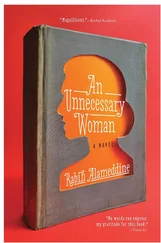“You should also be proud of your grandfather,” he said. I noticed all eyes on me. The elevator doors kept trying to close. “I always liked you. You should come and visit.” He stepped into the elevator and disappeared behind the closing doors. I stared at the spot where he’d been.
“Why does your father have to be rude?” Hafez said. He was holding his mother, acting as her cane. “Would it hurt him to be nice to the bey? The bey loves him, always says great things about him. We owe the bey so much. He shouldn’t treat him that way.”
Hafez was the closest cousin to me in age, and the family had assumed that we’d have so much in common, we’d grow up to be twins. We actually turned out to be total opposites. We were supposed to be best friends, but we barely got along. He was an insider, and I an outsider.
His mother chided him: “Don’t talk about your uncle like that.”
“He’s just like Grandfather,” he said. “Obstinate.”
Hafez didn’t know what he was talking about. My grandfather had an altogether different kind of obstinacy from my father’s, which is why they could hardly speak to each other. Each wanted the other to see the world his way, but neither was willing to share spectacles. As I turned around, I heard Hafez say, “Why does Uncle disrespect me so? It’s not as if his children made anything out of themselves.”
Back in the room, I heard the same comparison. My father was apoplectic. My sister was trying to calm him down. “He’s just like his grandfather,” my father mumbled. “Obsequious, ass-kissing dimwit. Just like his grandfather. Son of a whore.”
Ah, my grandfather, the progenitor of this mess we called family.

And on the seventh night, outside the gates of Alexandria, Khayal knelt before his adored, defeated. “I have nothing more to offer, nothing but myself. If you want me to leave you, I will depart before the dawn, but if you take my hand, I will make you the same covenant that Ruth made with Naomi: Where you go I will go, and where you stay I will stay. Your people will be my people and your God my God. Where you die, I will die and there I will be buried.”
Jawad took Khayal’s hand.
Look here,” my grandfather said, pointing at the only colorless spot on the map spread across the wooden table. I sat beside him, but my head couldn’t get close enough for me to see. I stood on the chair, put a knee on the rickety table, felt as if I were floating atop a world of color. I saw Lebanon. I was able to recognize my country in faded purple, but his finger was farther north, above Tripoli. Turkey in yellow ocher. The exact spot discolored, bleached. “This is where I was born.” He didn’t look at the map, as if his fingers could find his birthplace by touch. “Urfa, it’s called. Now they call it Şanliurfa. Means ‘glorious Urfa.’ Damnable Urfa is more like it.”
He cursed easily, smoothly, one reason my mother didn’t want me spending too much time with him. But Aunt Samia always insisted on it. He was family. I was a descendant. She was headstrong. That day, she had driven her three sons and me up from Beirut, dropped us at his house in the morning, and left to make her monthly visits in the village. My cousins preferred to play with the bey’s nephews. As was their habit, Hafez, Anwar, and Munir walked up to the bey’s mansion the instant their mother drove off. My grandfather did not allow me to leave him.
“I am of a time when maps had fewer colors,” he was saying. Shaggy white hair sprouted as profusely from his ears and brows as it did from his head. He wasn’t in a good mood.
I didn’t always understand what he said, but that never stopped him. He stood up. I remained above the map, hovering in its sky. He gesticulated wildly; the floorboards creaked beneath his pacing, an off-key Morse code. “They say Şanliurfa has a mixture of Turkish and Arabic cultures. Sometimes they might even mention the Kurds. But never, if you see all the brochures and travel agents, never do they mention the Armenians. As if we were never there.”
“Who are they, and who are we?” I asked
He stopped and stared out the grimy window into the distance as pinecones crackled in the iron stove.
Ah, Urfa, city of prophets. Jethro, Job, Elijah, and Moses spent part of their lives there, but it will always remain the city of Abraham, his birthplace. Yet Urfa’s history is far more complex than mere myths, mere tales. It is Osrhoe, it is Edessa. It is in the Bible, the Koran, the Torah.
In the days of the mighty King Nimrod, there lived a young man named Abraham, son of Azar, an idol-maker. Out of wood, Azar sculpted beautiful gods that the people loved and worshipped. Azar would send his son to market with the idols, but Abraham never sold any. He called out, “Who’ll buy my idols? They’re cheap and worthless. Will you buy one? It won’t hurt you.” When a passerby stopped to look at the beauty of the craftsmanship, Abraham slapped the idol. “Talk,” he said. “Tell this honest man to buy you. Do something.” There would be no sale.
Of course, his father was upset. He was losing money and had a nonbeliever for a son. He told Abraham to believe in the gods or leave the house. Abraham left.
Abraham walked into a temple while all the townsfolk were in their own homes preparing for an evening of worshipping their beloved gods. Abraham held out food for the gods. “Eat. Aren’t you hungry? Why don’t you talk to me?” Again he slapped their faces, one by one. Slap, move over, slap. But then he took an ax and chopped the gods to pieces, some as small as toothpicks. He chopped all but the largest, and put the ax in this idol’s hand.
When the people came to worship their gods, they found them in a large pile around the chief idol. They bemoaned their fate and that of their gods. “Who would do this?” they cried in unison, a chorus of wails.
“Surely it was someone,” Abraham exclaimed. “The big one stands there with a guilty ax in his hand. Perhaps he was envious of the rest and chopped them up. Should we ask him?”
“You know they don’t speak,” the priest said.
“Then why do you worship them?”
“Heresy,” the people called, and took him to see his king.
My grandfather was the product of an indiscreet affair. His father was Simon Twining — like the tea — an alcoholic English doctor, a missionary helping Christian Armenians in southern Turkey. His mother, Lucine, was one of the doctor’s Armenian servants.
My grandfather’s first name, Ismail, was predetermined. What would you call a son of your maid if you lived in Urfa? His last name was not Twining. The doctor’s wife wouldn’t allow that. It was Guiragossian, his mother’s name. He received his full name, our family’s bane, in Lebanon, as a full-fledged hakawati.
What is a hakawati, you ask? Ah, listen.
A hakawati is a teller of tales, myths, and fables (hekayât). A storyteller, an entertainer. A troubadour of sorts, someone who earns his keep by beguiling an audience with yarns. Like the word “hekayeh” (story, fable, news), “hakawati” is derived from the Lebanese word “haki,” which means “talk” or “conversation.” This suggests that in Lebanese the mere act of talking is storytelling.
A great hakawati grows rich, and a bad one sleeps hungry or headless. In the old days, villages had their own hakawatis, but great ones left their homes to earn fortunes. In the cities, cafés were the hakawatis’ domain. A hakawati can tell a tale in one sitting or spin the same tale over a period of months, impregnating it with nightly cliffhangers.
It is said that in the eighteenth century, in a café in Aleppo, the great one, Ahmad al-Saidawi, once told the story of King Baybars for three hundred and seventy-two evenings, which may or may not have been a record. It is also said that al-Saidawi cut the story short because the Ottoman governor begged him to finish it. The city’s despot had spent every night enthralled and had been recalled to Istanbul for growing lax with the affairs of state, even neglecting the collection of taxes. The governor needed to know how the tale ended.
Читать дальше













